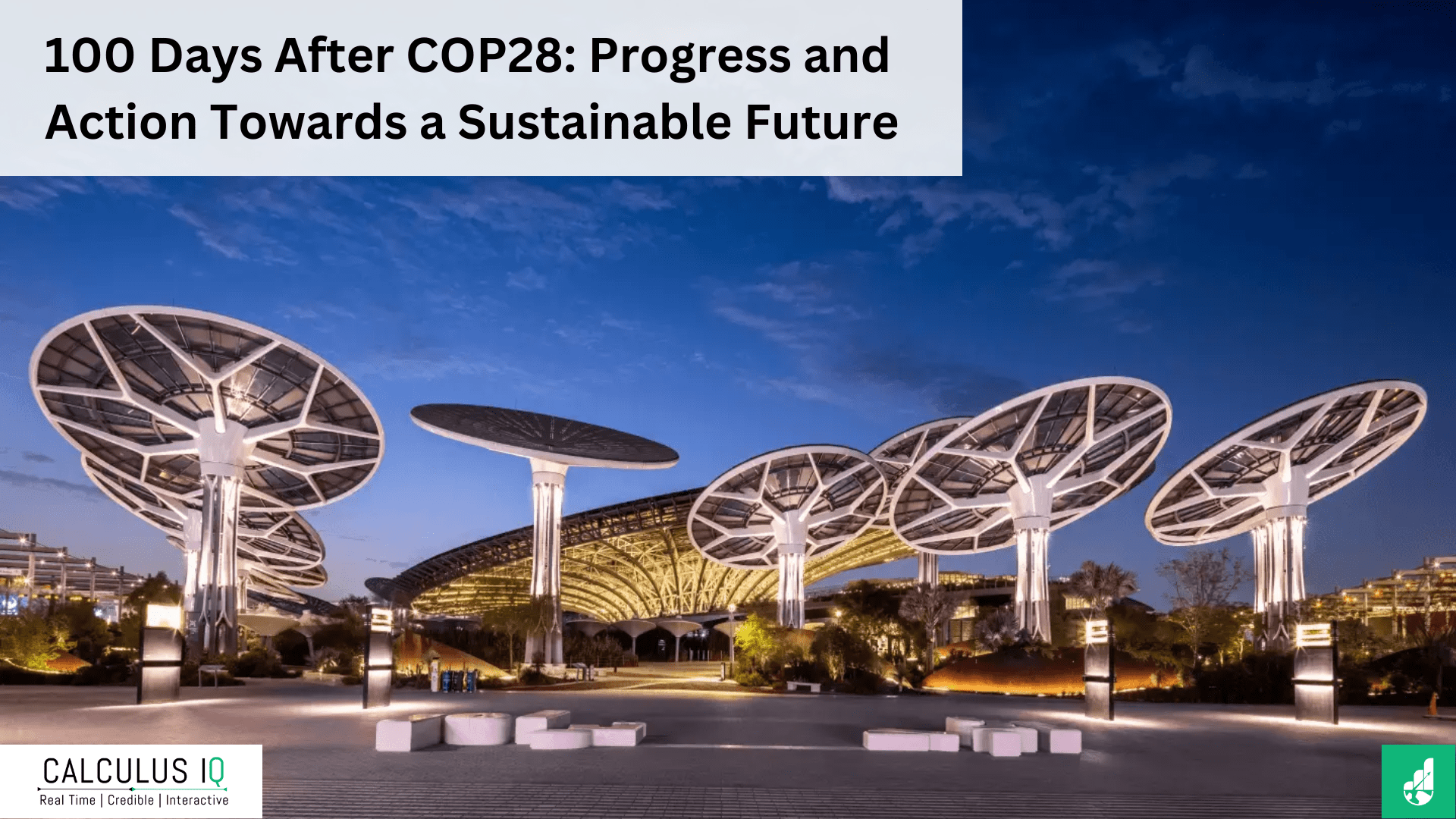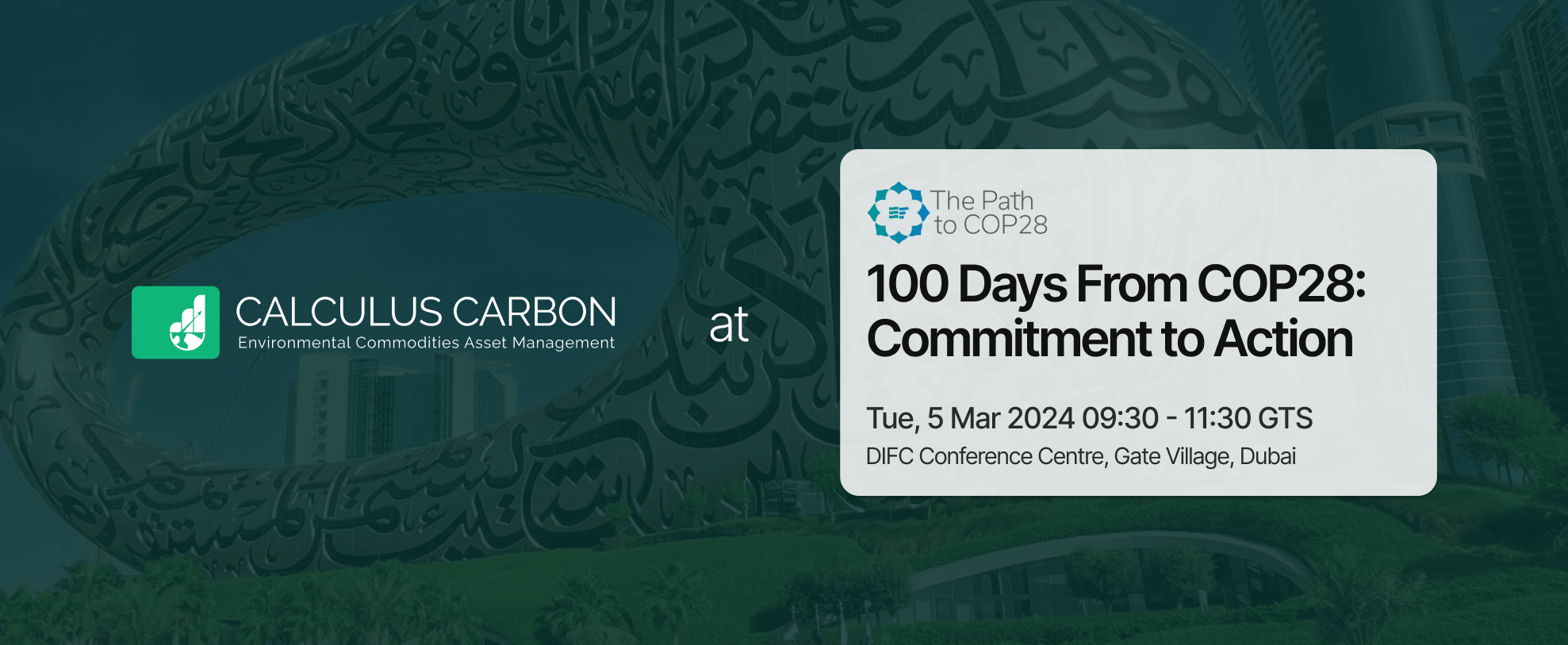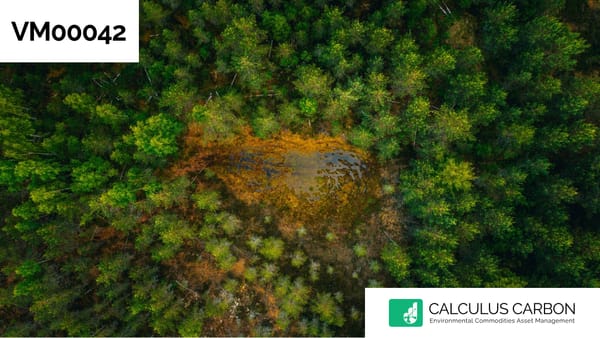100 Days After COP28: Progress and Action Towards a Sustainable Future

The aftermath of COP28, held in the United Arab Emirates, marks a pivotal moment in the global fight against climate change. With ambitious declarations and commitments made during the conference, the subsequent 100 days have seen significant progress and action towards building a more sustainable future.
Calculus Carbon attended the "100 Days from COP28: Commitment to Action in Dubai" event, where we gained valuable insights into the strides made by stakeholders in advancing sustainability initiatives. In addition to these insights, we have synthesized key takeaways from the event to provide a comprehensive overview of the progress achieved post-COP28.

UAE Leaders' Declaration on Global Climate Finance Framework:
At the heart of the outcomes from COP28 lies the UAE leaders' declaration on the Global Climate Finance Framework. This landmark agreement sets forth ambitious targets to channel trillions of dollars annually into greening the global economy by 2030, aligning with the goals of the Paris Agreement and the Sustainable Development Goals. It underscores the critical need for collective action, urging developed nations to fulfill their promise of mobilizing $100 billion annually for climate action in developing countries.
Financial Innovations and Regulatory Strides:
Following COP28, regulatory bodies and financial institutions in the UAE have demonstrated a strong commitment to advancing the sustainability agenda. Regulatory strides from entities like the DIC and the Central Bank of the UAE have paved the way for the adoption of commitments made at COP28. Notable market activities include substantial transactions such as green bonds, sustainability Sukuk, and investments in renewable energy projects. These initiatives reflect the growing momentum and international interest in the UAE's sustainability agenda.
Private Sector Engagement and Innovation:
The private sector has emerged as a key driver in scaling up climate finance and fostering sustainability. Financial institutions like Emirates NBD and the National Bank of Fujairah are actively integrating sustainability principles into their operations and engaging with customers to promote sustainable finance solutions. Initiatives such as the UAE Banking Federation's pledge of $1 trillion in sustainable finance by 2030 demonstrate a concerted effort to align banking operations with environmental objectives.
Regulatory Facilitation and Market Development:
Regulators like the Dubai Financial Services Authority (DFSA) are playing a crucial role in facilitating market development and fostering a conducive environment for sustainable finance. Through initiatives like fee waivers for ESG issuances and voluntary guidelines for ESG and risk management, the DFSA is encouraging market participants to adopt sustainable practices at their own pace. The increase in ESG issuances and the diversification of market players indicate a positive trend towards sustainable finance integration.
Building a Sustainable Finance Ecosystem:
Partnerships between public and private entities are essential for building a robust sustainable finance ecosystem. Organizations like the Global Ethical Finance Initiative (GEFI) and the Dubai International Financial Centre (DIFC) Authority are collaborating to catalyze momentum and drive sustainable finance flows. Initiatives such as the Sustainable Finance Catalyst aim to train sustainable leaders, foster innovation, and grow the sustainable finance market to $100 billion by 2030.
Looking Ahead:
As the world continues to grapple with the challenges of climate change, the progress made in the 100 days following COP28 underscores the collective commitment towards a sustainable future. While significant strides have been achieved, much remains to be done. The ongoing engagement of financial institutions, regulators, and other stakeholders is crucial for sustaining momentum and accelerating progress towards a low-carbon, resilient economy.
In conclusion, the aftermath of COP28 in the UAE has ignited a renewed sense of urgency and purpose in addressing climate change. Through collaboration, innovation, and decisive action, stakeholders are forging a path towards a more sustainable and equitable future for generations to come. The journey towards sustainability is ongoing, but with continued dedication and determination, meaningful change is within reach.



